Leadership Styles, CSR, and Social Media in the Hospitality Sector
VerifiedAdded on 2023/01/11
|15
|4916
|88
Report
AI Summary
This report provides a comprehensive analysis of emerging trends in the hospitality industry, focusing on leadership styles, organizational responsibility, and the impact of social media. It examines various leadership styles, including autocratic, democratic, and transformational approaches, and their application within the Hilton London context. The report assesses how organizational responsibility and responsible leadership contribute to corporate leadership systems, ultimately facilitating competitive advantage. It further evaluates the benefits of Corporate Social Responsibility (CSR) for both the organization and the wider community, while also critically judging the benefits and risks of social media and proposing strategies for mitigating these risks. The report concludes with an overview of the key findings and recommendations for the hospitality sector.
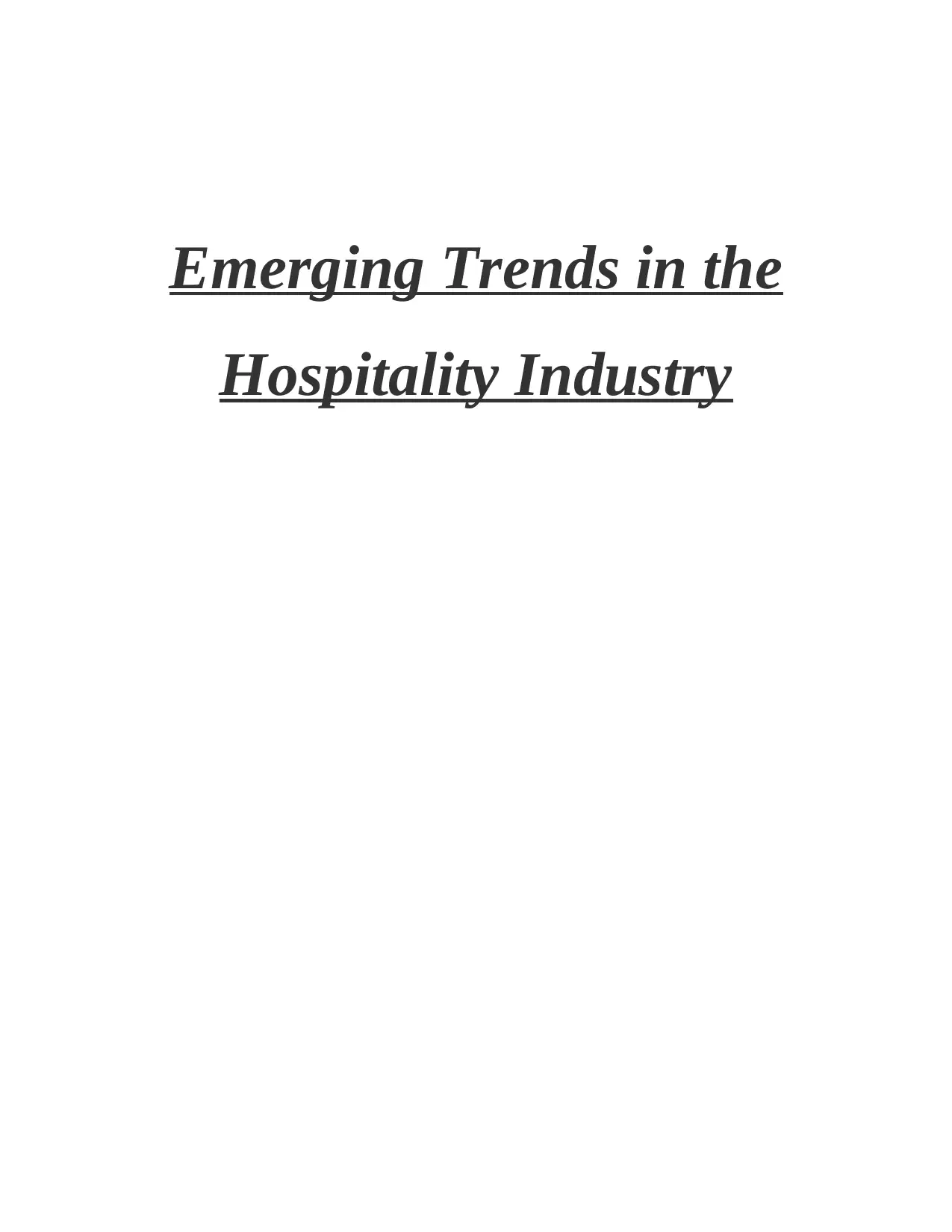
Emerging Trends in the
Hospitality Industry
Hospitality Industry
Paraphrase This Document
Need a fresh take? Get an instant paraphrase of this document with our AI Paraphraser
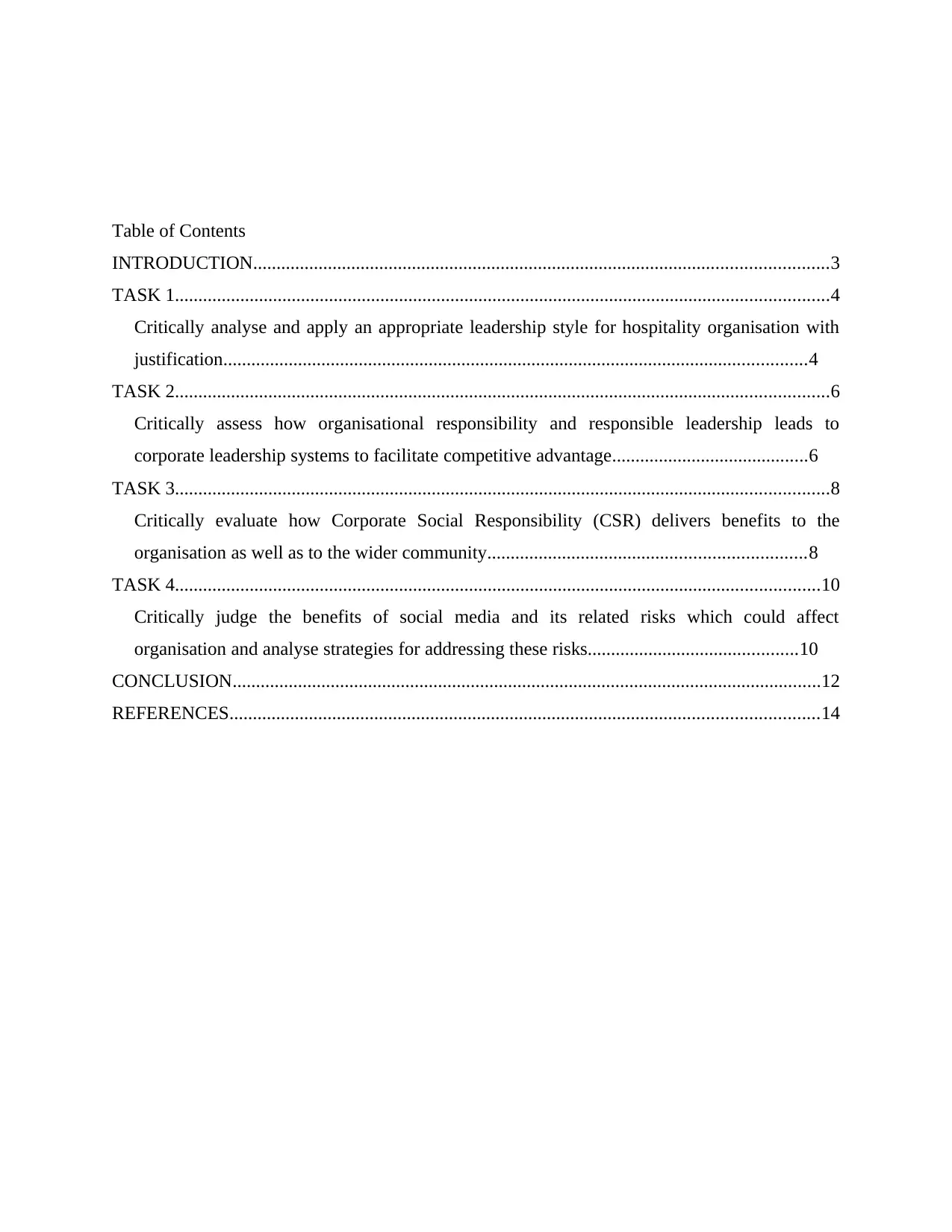
Table of Contents
INTRODUCTION...........................................................................................................................3
TASK 1............................................................................................................................................4
Critically analyse and apply an appropriate leadership style for hospitality organisation with
justification.............................................................................................................................4
TASK 2............................................................................................................................................6
Critically assess how organisational responsibility and responsible leadership leads to
corporate leadership systems to facilitate competitive advantage..........................................6
TASK 3............................................................................................................................................8
Critically evaluate how Corporate Social Responsibility (CSR) delivers benefits to the
organisation as well as to the wider community....................................................................8
TASK 4..........................................................................................................................................10
Critically judge the benefits of social media and its related risks which could affect
organisation and analyse strategies for addressing these risks.............................................10
CONCLUSION..............................................................................................................................12
REFERENCES..............................................................................................................................14
INTRODUCTION...........................................................................................................................3
TASK 1............................................................................................................................................4
Critically analyse and apply an appropriate leadership style for hospitality organisation with
justification.............................................................................................................................4
TASK 2............................................................................................................................................6
Critically assess how organisational responsibility and responsible leadership leads to
corporate leadership systems to facilitate competitive advantage..........................................6
TASK 3............................................................................................................................................8
Critically evaluate how Corporate Social Responsibility (CSR) delivers benefits to the
organisation as well as to the wider community....................................................................8
TASK 4..........................................................................................................................................10
Critically judge the benefits of social media and its related risks which could affect
organisation and analyse strategies for addressing these risks.............................................10
CONCLUSION..............................................................................................................................12
REFERENCES..............................................................................................................................14
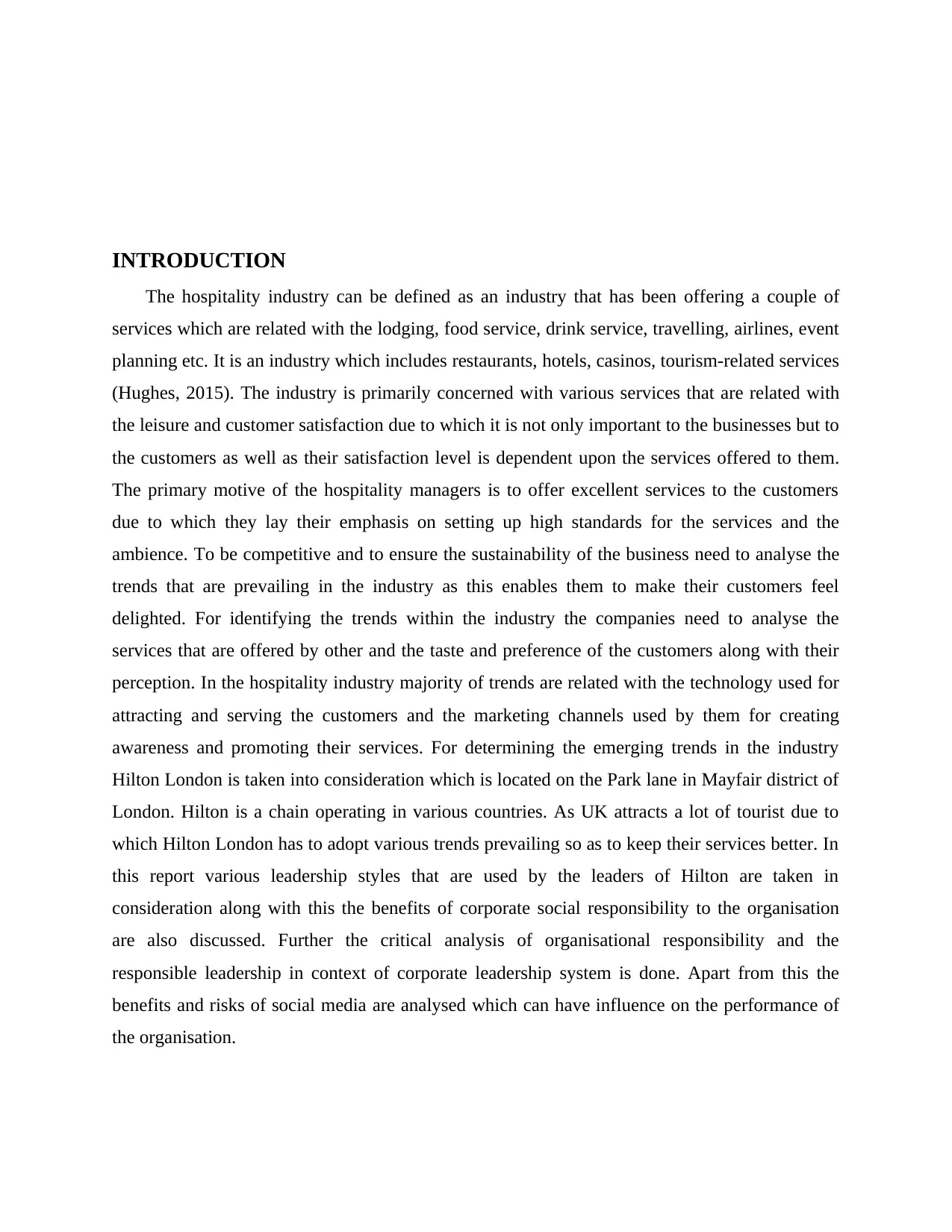
INTRODUCTION
The hospitality industry can be defined as an industry that has been offering a couple of
services which are related with the lodging, food service, drink service, travelling, airlines, event
planning etc. It is an industry which includes restaurants, hotels, casinos, tourism-related services
(Hughes, 2015). The industry is primarily concerned with various services that are related with
the leisure and customer satisfaction due to which it is not only important to the businesses but to
the customers as well as their satisfaction level is dependent upon the services offered to them.
The primary motive of the hospitality managers is to offer excellent services to the customers
due to which they lay their emphasis on setting up high standards for the services and the
ambience. To be competitive and to ensure the sustainability of the business need to analyse the
trends that are prevailing in the industry as this enables them to make their customers feel
delighted. For identifying the trends within the industry the companies need to analyse the
services that are offered by other and the taste and preference of the customers along with their
perception. In the hospitality industry majority of trends are related with the technology used for
attracting and serving the customers and the marketing channels used by them for creating
awareness and promoting their services. For determining the emerging trends in the industry
Hilton London is taken into consideration which is located on the Park lane in Mayfair district of
London. Hilton is a chain operating in various countries. As UK attracts a lot of tourist due to
which Hilton London has to adopt various trends prevailing so as to keep their services better. In
this report various leadership styles that are used by the leaders of Hilton are taken in
consideration along with this the benefits of corporate social responsibility to the organisation
are also discussed. Further the critical analysis of organisational responsibility and the
responsible leadership in context of corporate leadership system is done. Apart from this the
benefits and risks of social media are analysed which can have influence on the performance of
the organisation.
The hospitality industry can be defined as an industry that has been offering a couple of
services which are related with the lodging, food service, drink service, travelling, airlines, event
planning etc. It is an industry which includes restaurants, hotels, casinos, tourism-related services
(Hughes, 2015). The industry is primarily concerned with various services that are related with
the leisure and customer satisfaction due to which it is not only important to the businesses but to
the customers as well as their satisfaction level is dependent upon the services offered to them.
The primary motive of the hospitality managers is to offer excellent services to the customers
due to which they lay their emphasis on setting up high standards for the services and the
ambience. To be competitive and to ensure the sustainability of the business need to analyse the
trends that are prevailing in the industry as this enables them to make their customers feel
delighted. For identifying the trends within the industry the companies need to analyse the
services that are offered by other and the taste and preference of the customers along with their
perception. In the hospitality industry majority of trends are related with the technology used for
attracting and serving the customers and the marketing channels used by them for creating
awareness and promoting their services. For determining the emerging trends in the industry
Hilton London is taken into consideration which is located on the Park lane in Mayfair district of
London. Hilton is a chain operating in various countries. As UK attracts a lot of tourist due to
which Hilton London has to adopt various trends prevailing so as to keep their services better. In
this report various leadership styles that are used by the leaders of Hilton are taken in
consideration along with this the benefits of corporate social responsibility to the organisation
are also discussed. Further the critical analysis of organisational responsibility and the
responsible leadership in context of corporate leadership system is done. Apart from this the
benefits and risks of social media are analysed which can have influence on the performance of
the organisation.
⊘ This is a preview!⊘
Do you want full access?
Subscribe today to unlock all pages.

Trusted by 1+ million students worldwide
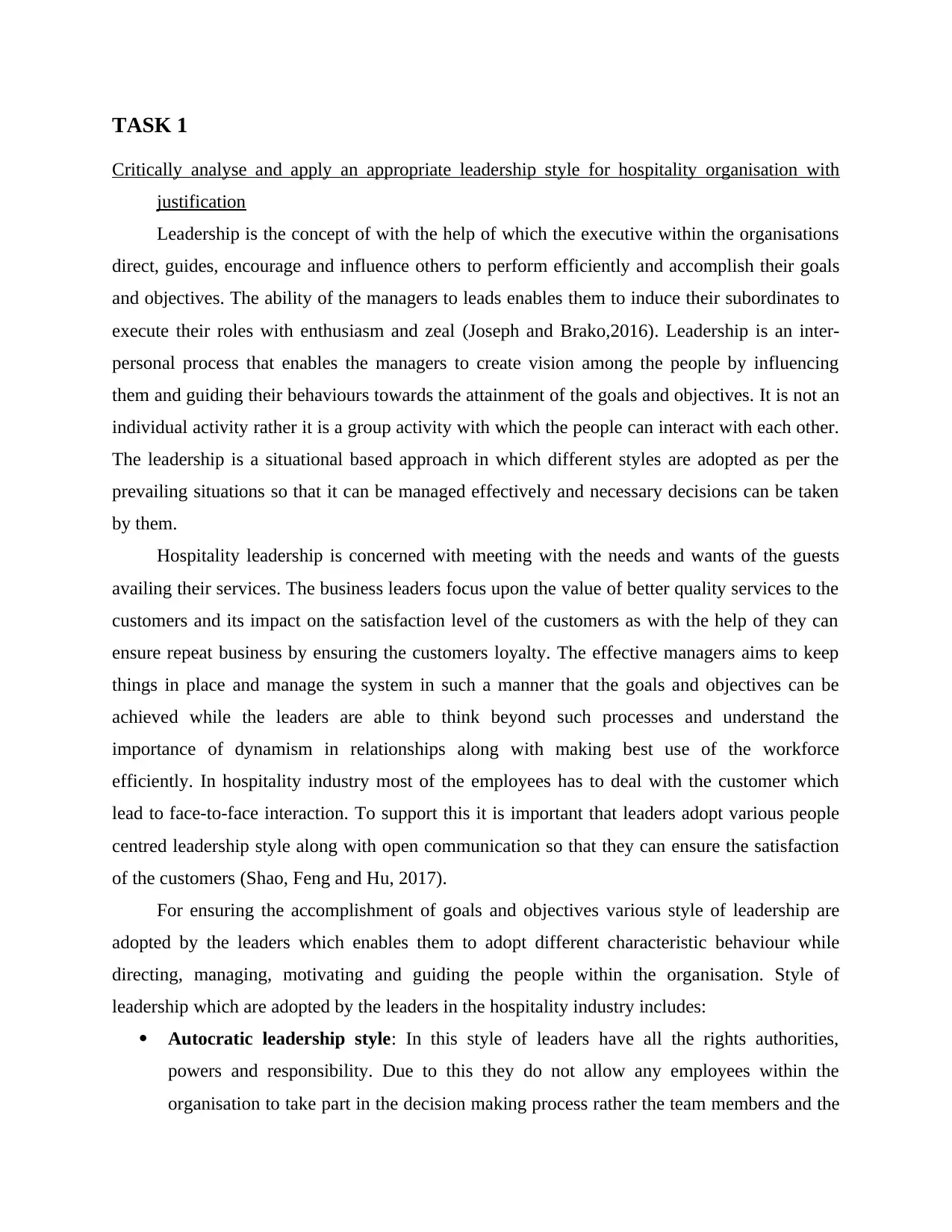
TASK 1
Critically analyse and apply an appropriate leadership style for hospitality organisation with
justification
Leadership is the concept of with the help of which the executive within the organisations
direct, guides, encourage and influence others to perform efficiently and accomplish their goals
and objectives. The ability of the managers to leads enables them to induce their subordinates to
execute their roles with enthusiasm and zeal (Joseph and Brako,2016). Leadership is an inter-
personal process that enables the managers to create vision among the people by influencing
them and guiding their behaviours towards the attainment of the goals and objectives. It is not an
individual activity rather it is a group activity with which the people can interact with each other.
The leadership is a situational based approach in which different styles are adopted as per the
prevailing situations so that it can be managed effectively and necessary decisions can be taken
by them.
Hospitality leadership is concerned with meeting with the needs and wants of the guests
availing their services. The business leaders focus upon the value of better quality services to the
customers and its impact on the satisfaction level of the customers as with the help of they can
ensure repeat business by ensuring the customers loyalty. The effective managers aims to keep
things in place and manage the system in such a manner that the goals and objectives can be
achieved while the leaders are able to think beyond such processes and understand the
importance of dynamism in relationships along with making best use of the workforce
efficiently. In hospitality industry most of the employees has to deal with the customer which
lead to face-to-face interaction. To support this it is important that leaders adopt various people
centred leadership style along with open communication so that they can ensure the satisfaction
of the customers (Shao, Feng and Hu, 2017).
For ensuring the accomplishment of goals and objectives various style of leadership are
adopted by the leaders which enables them to adopt different characteristic behaviour while
directing, managing, motivating and guiding the people within the organisation. Style of
leadership which are adopted by the leaders in the hospitality industry includes:
Autocratic leadership style: In this style of leaders have all the rights authorities,
powers and responsibility. Due to this they do not allow any employees within the
organisation to take part in the decision making process rather the team members and the
Critically analyse and apply an appropriate leadership style for hospitality organisation with
justification
Leadership is the concept of with the help of which the executive within the organisations
direct, guides, encourage and influence others to perform efficiently and accomplish their goals
and objectives. The ability of the managers to leads enables them to induce their subordinates to
execute their roles with enthusiasm and zeal (Joseph and Brako,2016). Leadership is an inter-
personal process that enables the managers to create vision among the people by influencing
them and guiding their behaviours towards the attainment of the goals and objectives. It is not an
individual activity rather it is a group activity with which the people can interact with each other.
The leadership is a situational based approach in which different styles are adopted as per the
prevailing situations so that it can be managed effectively and necessary decisions can be taken
by them.
Hospitality leadership is concerned with meeting with the needs and wants of the guests
availing their services. The business leaders focus upon the value of better quality services to the
customers and its impact on the satisfaction level of the customers as with the help of they can
ensure repeat business by ensuring the customers loyalty. The effective managers aims to keep
things in place and manage the system in such a manner that the goals and objectives can be
achieved while the leaders are able to think beyond such processes and understand the
importance of dynamism in relationships along with making best use of the workforce
efficiently. In hospitality industry most of the employees has to deal with the customer which
lead to face-to-face interaction. To support this it is important that leaders adopt various people
centred leadership style along with open communication so that they can ensure the satisfaction
of the customers (Shao, Feng and Hu, 2017).
For ensuring the accomplishment of goals and objectives various style of leadership are
adopted by the leaders which enables them to adopt different characteristic behaviour while
directing, managing, motivating and guiding the people within the organisation. Style of
leadership which are adopted by the leaders in the hospitality industry includes:
Autocratic leadership style: In this style of leaders have all the rights authorities,
powers and responsibility. Due to this they do not allow any employees within the
organisation to take part in the decision making process rather the team members and the
Paraphrase This Document
Need a fresh take? Get an instant paraphrase of this document with our AI Paraphraser
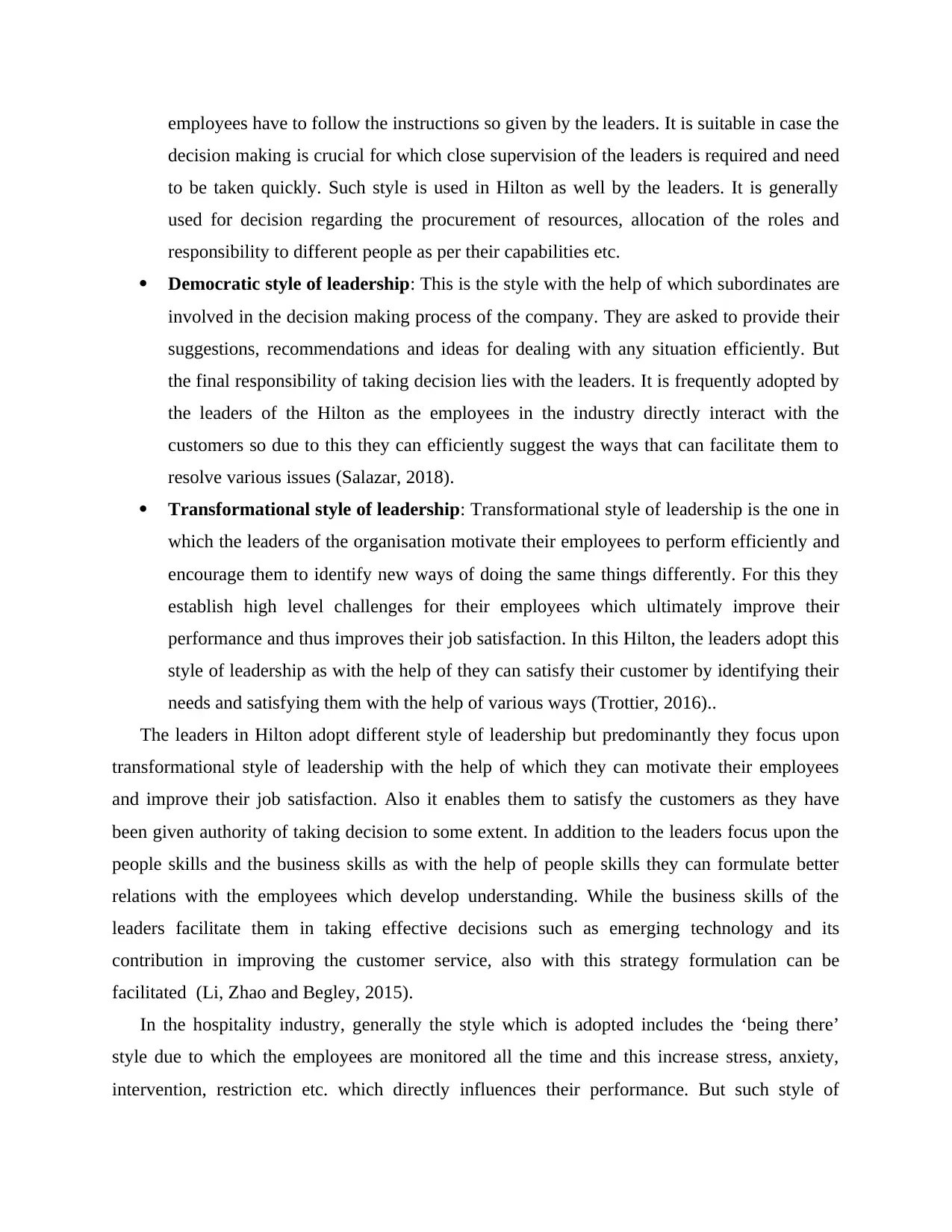
employees have to follow the instructions so given by the leaders. It is suitable in case the
decision making is crucial for which close supervision of the leaders is required and need
to be taken quickly. Such style is used in Hilton as well by the leaders. It is generally
used for decision regarding the procurement of resources, allocation of the roles and
responsibility to different people as per their capabilities etc.
Democratic style of leadership: This is the style with the help of which subordinates are
involved in the decision making process of the company. They are asked to provide their
suggestions, recommendations and ideas for dealing with any situation efficiently. But
the final responsibility of taking decision lies with the leaders. It is frequently adopted by
the leaders of the Hilton as the employees in the industry directly interact with the
customers so due to this they can efficiently suggest the ways that can facilitate them to
resolve various issues (Salazar, 2018).
Transformational style of leadership: Transformational style of leadership is the one in
which the leaders of the organisation motivate their employees to perform efficiently and
encourage them to identify new ways of doing the same things differently. For this they
establish high level challenges for their employees which ultimately improve their
performance and thus improves their job satisfaction. In this Hilton, the leaders adopt this
style of leadership as with the help of they can satisfy their customer by identifying their
needs and satisfying them with the help of various ways (Trottier, 2016)..
The leaders in Hilton adopt different style of leadership but predominantly they focus upon
transformational style of leadership with the help of which they can motivate their employees
and improve their job satisfaction. Also it enables them to satisfy the customers as they have
been given authority of taking decision to some extent. In addition to the leaders focus upon the
people skills and the business skills as with the help of people skills they can formulate better
relations with the employees which develop understanding. While the business skills of the
leaders facilitate them in taking effective decisions such as emerging technology and its
contribution in improving the customer service, also with this strategy formulation can be
facilitated (Li, Zhao and Begley, 2015).
In the hospitality industry, generally the style which is adopted includes the ‘being there’
style due to which the employees are monitored all the time and this increase stress, anxiety,
intervention, restriction etc. which directly influences their performance. But such style of
decision making is crucial for which close supervision of the leaders is required and need
to be taken quickly. Such style is used in Hilton as well by the leaders. It is generally
used for decision regarding the procurement of resources, allocation of the roles and
responsibility to different people as per their capabilities etc.
Democratic style of leadership: This is the style with the help of which subordinates are
involved in the decision making process of the company. They are asked to provide their
suggestions, recommendations and ideas for dealing with any situation efficiently. But
the final responsibility of taking decision lies with the leaders. It is frequently adopted by
the leaders of the Hilton as the employees in the industry directly interact with the
customers so due to this they can efficiently suggest the ways that can facilitate them to
resolve various issues (Salazar, 2018).
Transformational style of leadership: Transformational style of leadership is the one in
which the leaders of the organisation motivate their employees to perform efficiently and
encourage them to identify new ways of doing the same things differently. For this they
establish high level challenges for their employees which ultimately improve their
performance and thus improves their job satisfaction. In this Hilton, the leaders adopt this
style of leadership as with the help of they can satisfy their customer by identifying their
needs and satisfying them with the help of various ways (Trottier, 2016)..
The leaders in Hilton adopt different style of leadership but predominantly they focus upon
transformational style of leadership with the help of which they can motivate their employees
and improve their job satisfaction. Also it enables them to satisfy the customers as they have
been given authority of taking decision to some extent. In addition to the leaders focus upon the
people skills and the business skills as with the help of people skills they can formulate better
relations with the employees which develop understanding. While the business skills of the
leaders facilitate them in taking effective decisions such as emerging technology and its
contribution in improving the customer service, also with this strategy formulation can be
facilitated (Li, Zhao and Begley, 2015).
In the hospitality industry, generally the style which is adopted includes the ‘being there’
style due to which the employees are monitored all the time and this increase stress, anxiety,
intervention, restriction etc. which directly influences their performance. But such style of
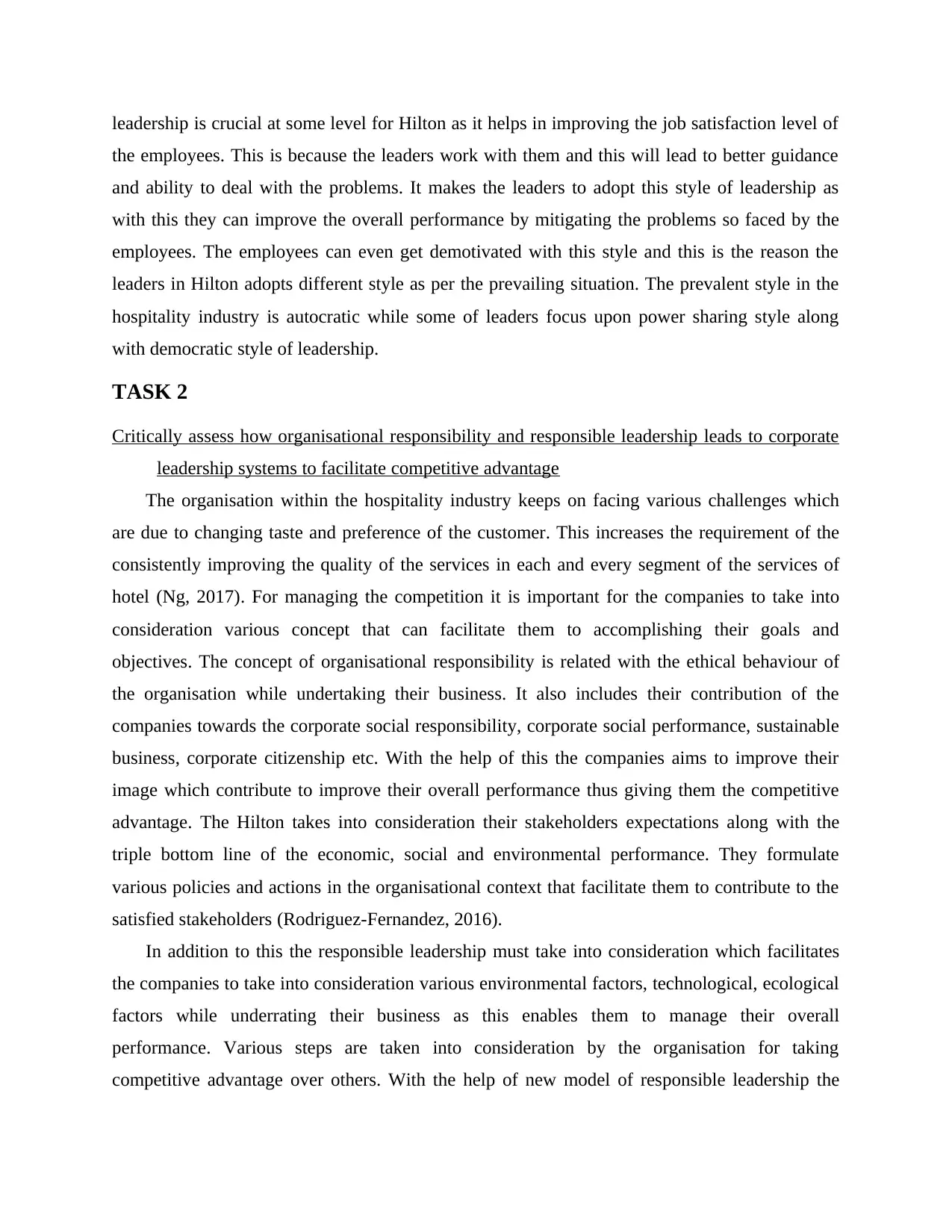
leadership is crucial at some level for Hilton as it helps in improving the job satisfaction level of
the employees. This is because the leaders work with them and this will lead to better guidance
and ability to deal with the problems. It makes the leaders to adopt this style of leadership as
with this they can improve the overall performance by mitigating the problems so faced by the
employees. The employees can even get demotivated with this style and this is the reason the
leaders in Hilton adopts different style as per the prevailing situation. The prevalent style in the
hospitality industry is autocratic while some of leaders focus upon power sharing style along
with democratic style of leadership.
TASK 2
Critically assess how organisational responsibility and responsible leadership leads to corporate
leadership systems to facilitate competitive advantage
The organisation within the hospitality industry keeps on facing various challenges which
are due to changing taste and preference of the customer. This increases the requirement of the
consistently improving the quality of the services in each and every segment of the services of
hotel (Ng, 2017). For managing the competition it is important for the companies to take into
consideration various concept that can facilitate them to accomplishing their goals and
objectives. The concept of organisational responsibility is related with the ethical behaviour of
the organisation while undertaking their business. It also includes their contribution of the
companies towards the corporate social responsibility, corporate social performance, sustainable
business, corporate citizenship etc. With the help of this the companies aims to improve their
image which contribute to improve their overall performance thus giving them the competitive
advantage. The Hilton takes into consideration their stakeholders expectations along with the
triple bottom line of the economic, social and environmental performance. They formulate
various policies and actions in the organisational context that facilitate them to contribute to the
satisfied stakeholders (Rodriguez-Fernandez, 2016).
In addition to this the responsible leadership must take into consideration which facilitates
the companies to take into consideration various environmental factors, technological, ecological
factors while underrating their business as this enables them to manage their overall
performance. Various steps are taken into consideration by the organisation for taking
competitive advantage over others. With the help of new model of responsible leadership the
the employees. This is because the leaders work with them and this will lead to better guidance
and ability to deal with the problems. It makes the leaders to adopt this style of leadership as
with this they can improve the overall performance by mitigating the problems so faced by the
employees. The employees can even get demotivated with this style and this is the reason the
leaders in Hilton adopts different style as per the prevailing situation. The prevalent style in the
hospitality industry is autocratic while some of leaders focus upon power sharing style along
with democratic style of leadership.
TASK 2
Critically assess how organisational responsibility and responsible leadership leads to corporate
leadership systems to facilitate competitive advantage
The organisation within the hospitality industry keeps on facing various challenges which
are due to changing taste and preference of the customer. This increases the requirement of the
consistently improving the quality of the services in each and every segment of the services of
hotel (Ng, 2017). For managing the competition it is important for the companies to take into
consideration various concept that can facilitate them to accomplishing their goals and
objectives. The concept of organisational responsibility is related with the ethical behaviour of
the organisation while undertaking their business. It also includes their contribution of the
companies towards the corporate social responsibility, corporate social performance, sustainable
business, corporate citizenship etc. With the help of this the companies aims to improve their
image which contribute to improve their overall performance thus giving them the competitive
advantage. The Hilton takes into consideration their stakeholders expectations along with the
triple bottom line of the economic, social and environmental performance. They formulate
various policies and actions in the organisational context that facilitate them to contribute to the
satisfied stakeholders (Rodriguez-Fernandez, 2016).
In addition to this the responsible leadership must take into consideration which facilitates
the companies to take into consideration various environmental factors, technological, ecological
factors while underrating their business as this enables them to manage their overall
performance. Various steps are taken into consideration by the organisation for taking
competitive advantage over others. With the help of new model of responsible leadership the
⊘ This is a preview!⊘
Do you want full access?
Subscribe today to unlock all pages.

Trusted by 1+ million students worldwide
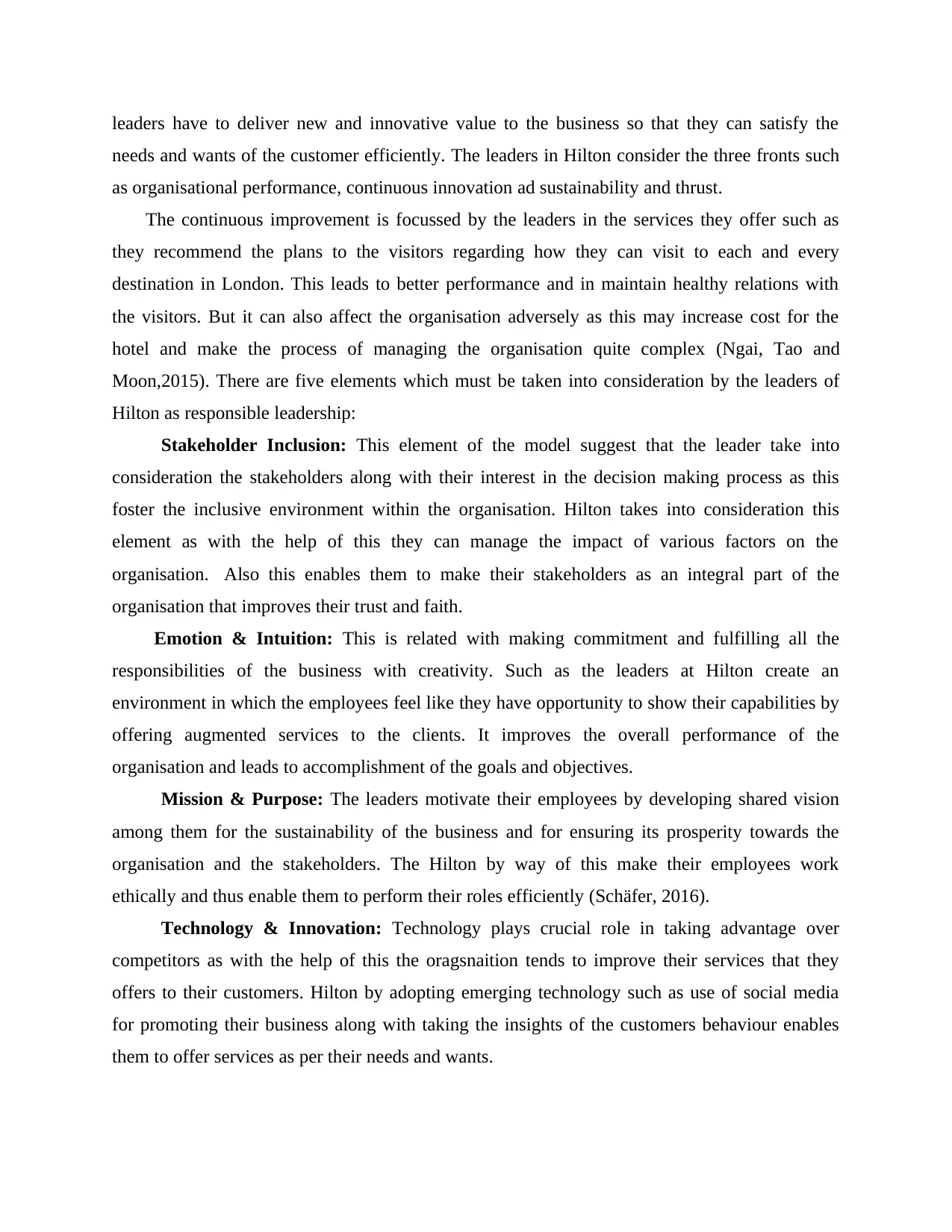
leaders have to deliver new and innovative value to the business so that they can satisfy the
needs and wants of the customer efficiently. The leaders in Hilton consider the three fronts such
as organisational performance, continuous innovation ad sustainability and thrust.
The continuous improvement is focussed by the leaders in the services they offer such as
they recommend the plans to the visitors regarding how they can visit to each and every
destination in London. This leads to better performance and in maintain healthy relations with
the visitors. But it can also affect the organisation adversely as this may increase cost for the
hotel and make the process of managing the organisation quite complex (Ngai, Tao and
Moon,2015). There are five elements which must be taken into consideration by the leaders of
Hilton as responsible leadership:
Stakeholder Inclusion: This element of the model suggest that the leader take into
consideration the stakeholders along with their interest in the decision making process as this
foster the inclusive environment within the organisation. Hilton takes into consideration this
element as with the help of this they can manage the impact of various factors on the
organisation. Also this enables them to make their stakeholders as an integral part of the
organisation that improves their trust and faith.
Emotion & Intuition: This is related with making commitment and fulfilling all the
responsibilities of the business with creativity. Such as the leaders at Hilton create an
environment in which the employees feel like they have opportunity to show their capabilities by
offering augmented services to the clients. It improves the overall performance of the
organisation and leads to accomplishment of the goals and objectives.
Mission & Purpose: The leaders motivate their employees by developing shared vision
among them for the sustainability of the business and for ensuring its prosperity towards the
organisation and the stakeholders. The Hilton by way of this make their employees work
ethically and thus enable them to perform their roles efficiently (Schäfer, 2016).
Technology & Innovation: Technology plays crucial role in taking advantage over
competitors as with the help of this the oragsnaition tends to improve their services that they
offers to their customers. Hilton by adopting emerging technology such as use of social media
for promoting their business along with taking the insights of the customers behaviour enables
them to offer services as per their needs and wants.
needs and wants of the customer efficiently. The leaders in Hilton consider the three fronts such
as organisational performance, continuous innovation ad sustainability and thrust.
The continuous improvement is focussed by the leaders in the services they offer such as
they recommend the plans to the visitors regarding how they can visit to each and every
destination in London. This leads to better performance and in maintain healthy relations with
the visitors. But it can also affect the organisation adversely as this may increase cost for the
hotel and make the process of managing the organisation quite complex (Ngai, Tao and
Moon,2015). There are five elements which must be taken into consideration by the leaders of
Hilton as responsible leadership:
Stakeholder Inclusion: This element of the model suggest that the leader take into
consideration the stakeholders along with their interest in the decision making process as this
foster the inclusive environment within the organisation. Hilton takes into consideration this
element as with the help of this they can manage the impact of various factors on the
organisation. Also this enables them to make their stakeholders as an integral part of the
organisation that improves their trust and faith.
Emotion & Intuition: This is related with making commitment and fulfilling all the
responsibilities of the business with creativity. Such as the leaders at Hilton create an
environment in which the employees feel like they have opportunity to show their capabilities by
offering augmented services to the clients. It improves the overall performance of the
organisation and leads to accomplishment of the goals and objectives.
Mission & Purpose: The leaders motivate their employees by developing shared vision
among them for the sustainability of the business and for ensuring its prosperity towards the
organisation and the stakeholders. The Hilton by way of this make their employees work
ethically and thus enable them to perform their roles efficiently (Schäfer, 2016).
Technology & Innovation: Technology plays crucial role in taking advantage over
competitors as with the help of this the oragsnaition tends to improve their services that they
offers to their customers. Hilton by adopting emerging technology such as use of social media
for promoting their business along with taking the insights of the customers behaviour enables
them to offer services as per their needs and wants.
Paraphrase This Document
Need a fresh take? Get an instant paraphrase of this document with our AI Paraphraser
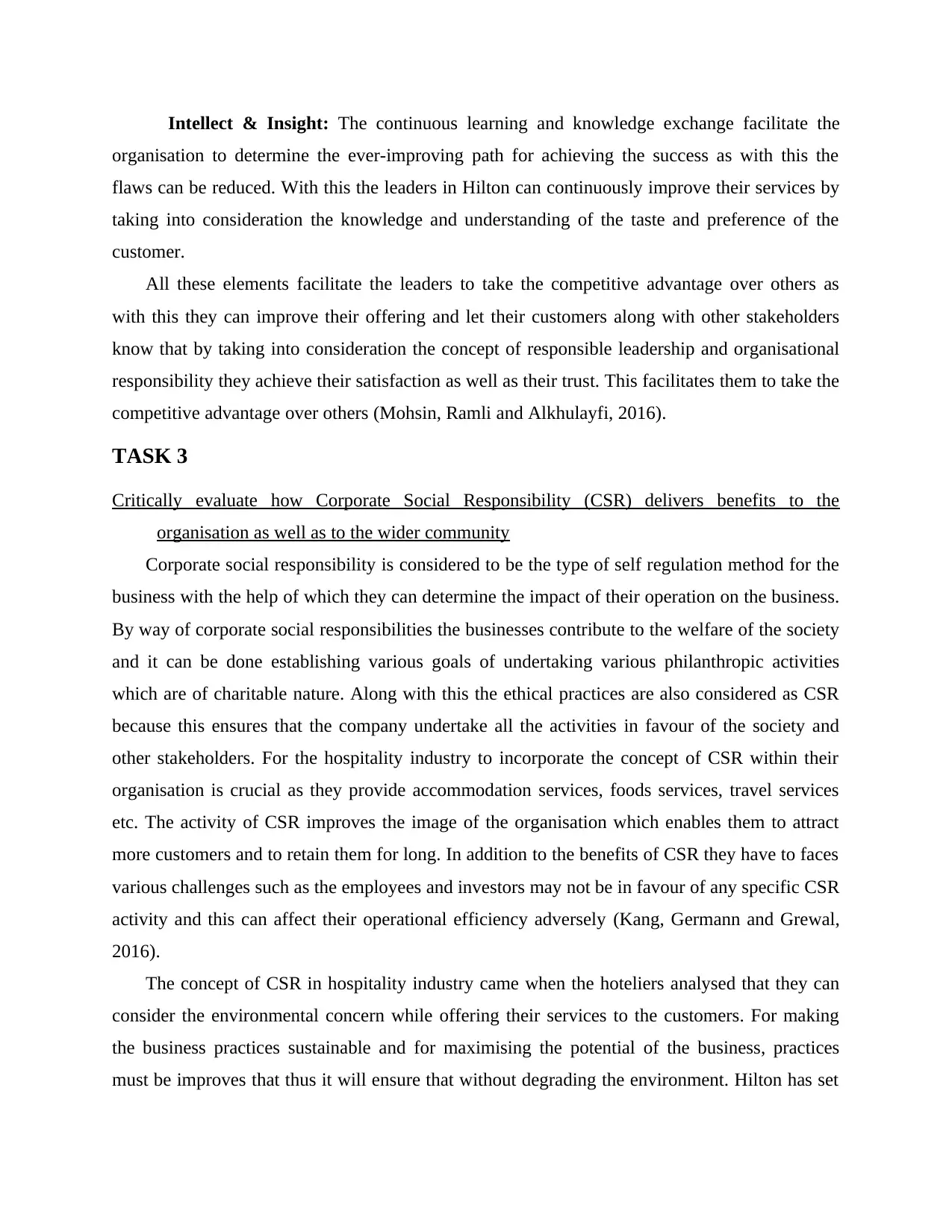
Intellect & Insight: The continuous learning and knowledge exchange facilitate the
organisation to determine the ever-improving path for achieving the success as with this the
flaws can be reduced. With this the leaders in Hilton can continuously improve their services by
taking into consideration the knowledge and understanding of the taste and preference of the
customer.
All these elements facilitate the leaders to take the competitive advantage over others as
with this they can improve their offering and let their customers along with other stakeholders
know that by taking into consideration the concept of responsible leadership and organisational
responsibility they achieve their satisfaction as well as their trust. This facilitates them to take the
competitive advantage over others (Mohsin, Ramli and Alkhulayfi, 2016).
TASK 3
Critically evaluate how Corporate Social Responsibility (CSR) delivers benefits to the
organisation as well as to the wider community
Corporate social responsibility is considered to be the type of self regulation method for the
business with the help of which they can determine the impact of their operation on the business.
By way of corporate social responsibilities the businesses contribute to the welfare of the society
and it can be done establishing various goals of undertaking various philanthropic activities
which are of charitable nature. Along with this the ethical practices are also considered as CSR
because this ensures that the company undertake all the activities in favour of the society and
other stakeholders. For the hospitality industry to incorporate the concept of CSR within their
organisation is crucial as they provide accommodation services, foods services, travel services
etc. The activity of CSR improves the image of the organisation which enables them to attract
more customers and to retain them for long. In addition to the benefits of CSR they have to faces
various challenges such as the employees and investors may not be in favour of any specific CSR
activity and this can affect their operational efficiency adversely (Kang, Germann and Grewal,
2016).
The concept of CSR in hospitality industry came when the hoteliers analysed that they can
consider the environmental concern while offering their services to the customers. For making
the business practices sustainable and for maximising the potential of the business, practices
must be improves that thus it will ensure that without degrading the environment. Hilton has set
organisation to determine the ever-improving path for achieving the success as with this the
flaws can be reduced. With this the leaders in Hilton can continuously improve their services by
taking into consideration the knowledge and understanding of the taste and preference of the
customer.
All these elements facilitate the leaders to take the competitive advantage over others as
with this they can improve their offering and let their customers along with other stakeholders
know that by taking into consideration the concept of responsible leadership and organisational
responsibility they achieve their satisfaction as well as their trust. This facilitates them to take the
competitive advantage over others (Mohsin, Ramli and Alkhulayfi, 2016).
TASK 3
Critically evaluate how Corporate Social Responsibility (CSR) delivers benefits to the
organisation as well as to the wider community
Corporate social responsibility is considered to be the type of self regulation method for the
business with the help of which they can determine the impact of their operation on the business.
By way of corporate social responsibilities the businesses contribute to the welfare of the society
and it can be done establishing various goals of undertaking various philanthropic activities
which are of charitable nature. Along with this the ethical practices are also considered as CSR
because this ensures that the company undertake all the activities in favour of the society and
other stakeholders. For the hospitality industry to incorporate the concept of CSR within their
organisation is crucial as they provide accommodation services, foods services, travel services
etc. The activity of CSR improves the image of the organisation which enables them to attract
more customers and to retain them for long. In addition to the benefits of CSR they have to faces
various challenges such as the employees and investors may not be in favour of any specific CSR
activity and this can affect their operational efficiency adversely (Kang, Germann and Grewal,
2016).
The concept of CSR in hospitality industry came when the hoteliers analysed that they can
consider the environmental concern while offering their services to the customers. For making
the business practices sustainable and for maximising the potential of the business, practices
must be improves that thus it will ensure that without degrading the environment. Hilton has set
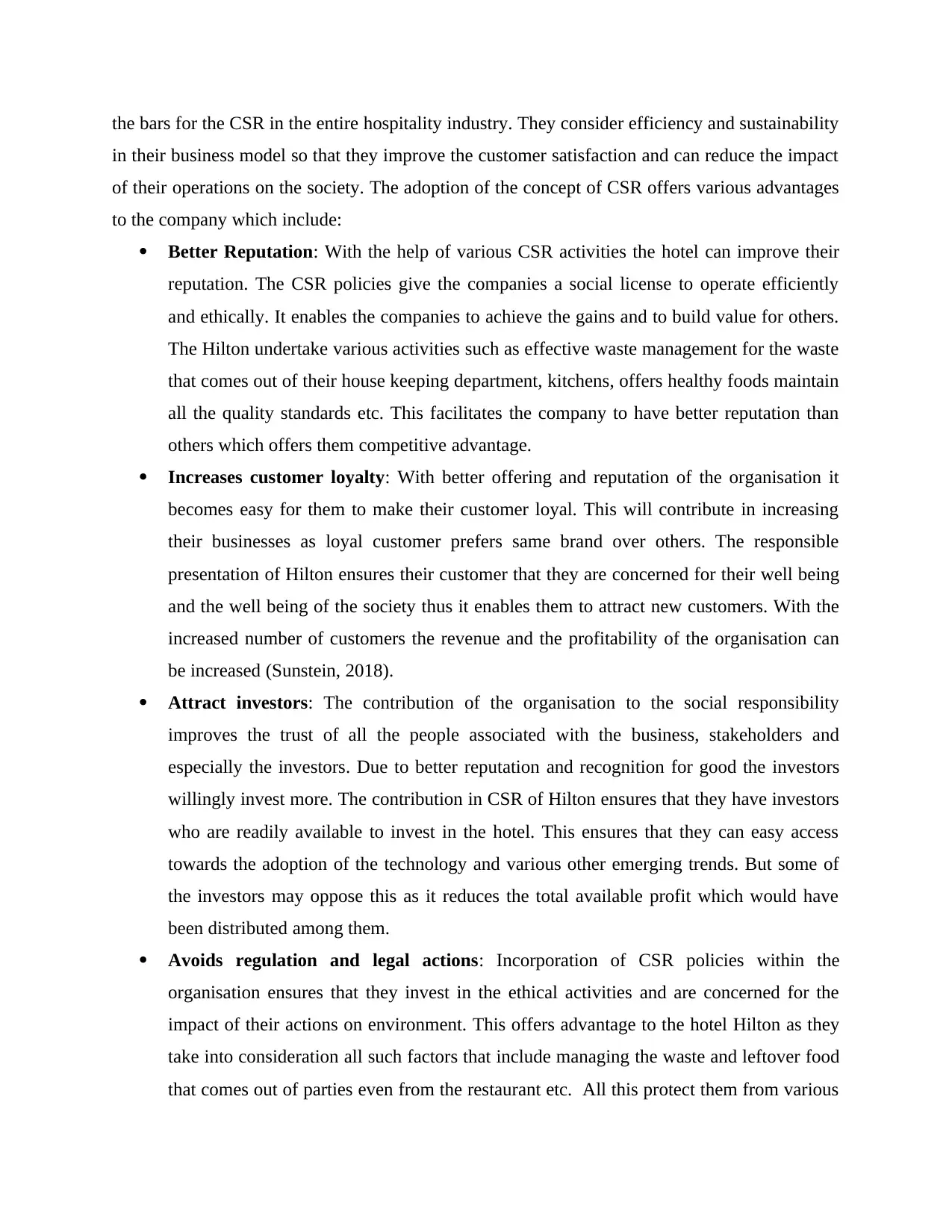
the bars for the CSR in the entire hospitality industry. They consider efficiency and sustainability
in their business model so that they improve the customer satisfaction and can reduce the impact
of their operations on the society. The adoption of the concept of CSR offers various advantages
to the company which include:
Better Reputation: With the help of various CSR activities the hotel can improve their
reputation. The CSR policies give the companies a social license to operate efficiently
and ethically. It enables the companies to achieve the gains and to build value for others.
The Hilton undertake various activities such as effective waste management for the waste
that comes out of their house keeping department, kitchens, offers healthy foods maintain
all the quality standards etc. This facilitates the company to have better reputation than
others which offers them competitive advantage.
Increases customer loyalty: With better offering and reputation of the organisation it
becomes easy for them to make their customer loyal. This will contribute in increasing
their businesses as loyal customer prefers same brand over others. The responsible
presentation of Hilton ensures their customer that they are concerned for their well being
and the well being of the society thus it enables them to attract new customers. With the
increased number of customers the revenue and the profitability of the organisation can
be increased (Sunstein, 2018).
Attract investors: The contribution of the organisation to the social responsibility
improves the trust of all the people associated with the business, stakeholders and
especially the investors. Due to better reputation and recognition for good the investors
willingly invest more. The contribution in CSR of Hilton ensures that they have investors
who are readily available to invest in the hotel. This ensures that they can easy access
towards the adoption of the technology and various other emerging trends. But some of
the investors may oppose this as it reduces the total available profit which would have
been distributed among them.
Avoids regulation and legal actions: Incorporation of CSR policies within the
organisation ensures that they invest in the ethical activities and are concerned for the
impact of their actions on environment. This offers advantage to the hotel Hilton as they
take into consideration all such factors that include managing the waste and leftover food
that comes out of parties even from the restaurant etc. All this protect them from various
in their business model so that they improve the customer satisfaction and can reduce the impact
of their operations on the society. The adoption of the concept of CSR offers various advantages
to the company which include:
Better Reputation: With the help of various CSR activities the hotel can improve their
reputation. The CSR policies give the companies a social license to operate efficiently
and ethically. It enables the companies to achieve the gains and to build value for others.
The Hilton undertake various activities such as effective waste management for the waste
that comes out of their house keeping department, kitchens, offers healthy foods maintain
all the quality standards etc. This facilitates the company to have better reputation than
others which offers them competitive advantage.
Increases customer loyalty: With better offering and reputation of the organisation it
becomes easy for them to make their customer loyal. This will contribute in increasing
their businesses as loyal customer prefers same brand over others. The responsible
presentation of Hilton ensures their customer that they are concerned for their well being
and the well being of the society thus it enables them to attract new customers. With the
increased number of customers the revenue and the profitability of the organisation can
be increased (Sunstein, 2018).
Attract investors: The contribution of the organisation to the social responsibility
improves the trust of all the people associated with the business, stakeholders and
especially the investors. Due to better reputation and recognition for good the investors
willingly invest more. The contribution in CSR of Hilton ensures that they have investors
who are readily available to invest in the hotel. This ensures that they can easy access
towards the adoption of the technology and various other emerging trends. But some of
the investors may oppose this as it reduces the total available profit which would have
been distributed among them.
Avoids regulation and legal actions: Incorporation of CSR policies within the
organisation ensures that they invest in the ethical activities and are concerned for the
impact of their actions on environment. This offers advantage to the hotel Hilton as they
take into consideration all such factors that include managing the waste and leftover food
that comes out of parties even from the restaurant etc. All this protect them from various
⊘ This is a preview!⊘
Do you want full access?
Subscribe today to unlock all pages.

Trusted by 1+ million students worldwide
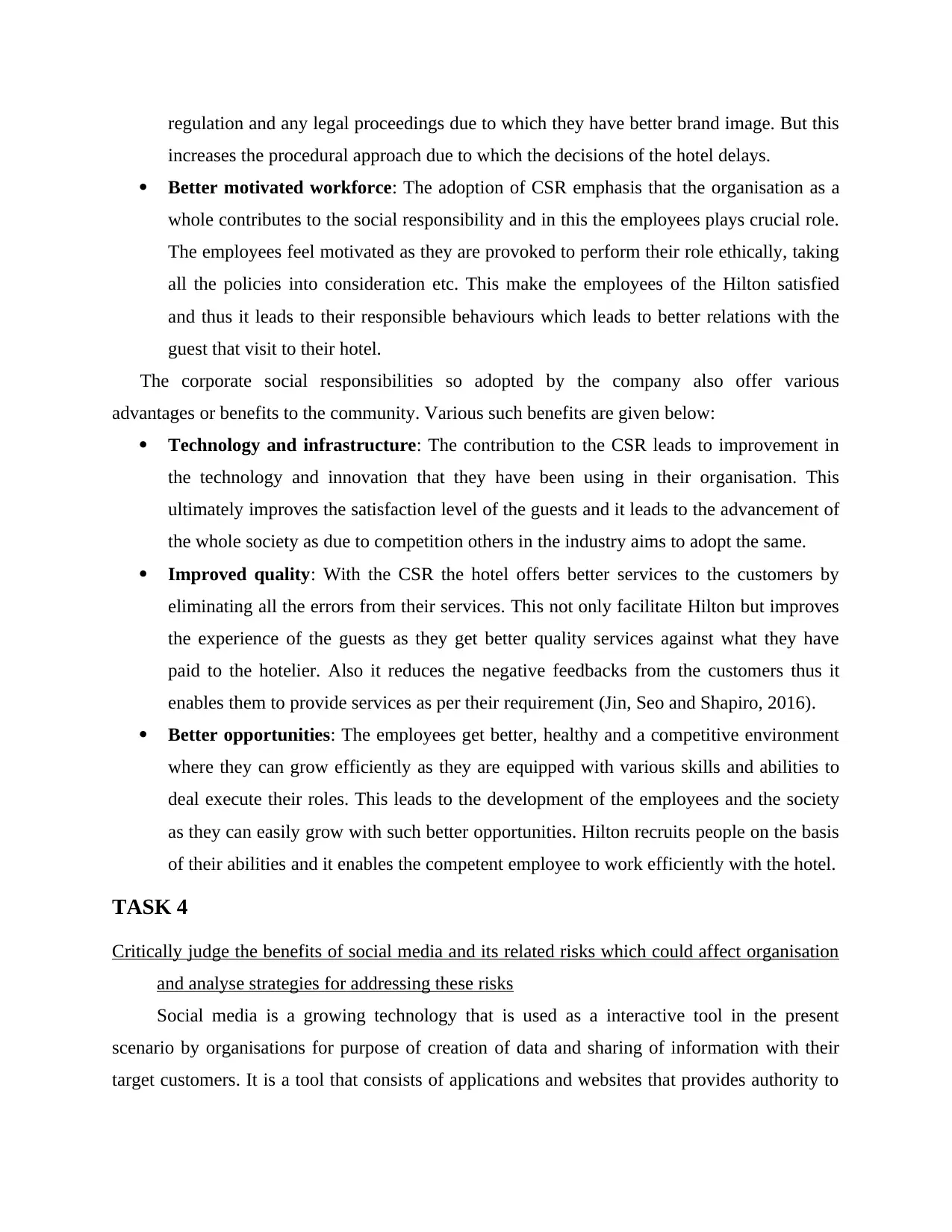
regulation and any legal proceedings due to which they have better brand image. But this
increases the procedural approach due to which the decisions of the hotel delays.
Better motivated workforce: The adoption of CSR emphasis that the organisation as a
whole contributes to the social responsibility and in this the employees plays crucial role.
The employees feel motivated as they are provoked to perform their role ethically, taking
all the policies into consideration etc. This make the employees of the Hilton satisfied
and thus it leads to their responsible behaviours which leads to better relations with the
guest that visit to their hotel.
The corporate social responsibilities so adopted by the company also offer various
advantages or benefits to the community. Various such benefits are given below:
Technology and infrastructure: The contribution to the CSR leads to improvement in
the technology and innovation that they have been using in their organisation. This
ultimately improves the satisfaction level of the guests and it leads to the advancement of
the whole society as due to competition others in the industry aims to adopt the same.
Improved quality: With the CSR the hotel offers better services to the customers by
eliminating all the errors from their services. This not only facilitate Hilton but improves
the experience of the guests as they get better quality services against what they have
paid to the hotelier. Also it reduces the negative feedbacks from the customers thus it
enables them to provide services as per their requirement (Jin, Seo and Shapiro, 2016).
Better opportunities: The employees get better, healthy and a competitive environment
where they can grow efficiently as they are equipped with various skills and abilities to
deal execute their roles. This leads to the development of the employees and the society
as they can easily grow with such better opportunities. Hilton recruits people on the basis
of their abilities and it enables the competent employee to work efficiently with the hotel.
TASK 4
Critically judge the benefits of social media and its related risks which could affect organisation
and analyse strategies for addressing these risks
Social media is a growing technology that is used as a interactive tool in the present
scenario by organisations for purpose of creation of data and sharing of information with their
target customers. It is a tool that consists of applications and websites that provides authority to
increases the procedural approach due to which the decisions of the hotel delays.
Better motivated workforce: The adoption of CSR emphasis that the organisation as a
whole contributes to the social responsibility and in this the employees plays crucial role.
The employees feel motivated as they are provoked to perform their role ethically, taking
all the policies into consideration etc. This make the employees of the Hilton satisfied
and thus it leads to their responsible behaviours which leads to better relations with the
guest that visit to their hotel.
The corporate social responsibilities so adopted by the company also offer various
advantages or benefits to the community. Various such benefits are given below:
Technology and infrastructure: The contribution to the CSR leads to improvement in
the technology and innovation that they have been using in their organisation. This
ultimately improves the satisfaction level of the guests and it leads to the advancement of
the whole society as due to competition others in the industry aims to adopt the same.
Improved quality: With the CSR the hotel offers better services to the customers by
eliminating all the errors from their services. This not only facilitate Hilton but improves
the experience of the guests as they get better quality services against what they have
paid to the hotelier. Also it reduces the negative feedbacks from the customers thus it
enables them to provide services as per their requirement (Jin, Seo and Shapiro, 2016).
Better opportunities: The employees get better, healthy and a competitive environment
where they can grow efficiently as they are equipped with various skills and abilities to
deal execute their roles. This leads to the development of the employees and the society
as they can easily grow with such better opportunities. Hilton recruits people on the basis
of their abilities and it enables the competent employee to work efficiently with the hotel.
TASK 4
Critically judge the benefits of social media and its related risks which could affect organisation
and analyse strategies for addressing these risks
Social media is a growing technology that is used as a interactive tool in the present
scenario by organisations for purpose of creation of data and sharing of information with their
target customers. It is a tool that consists of applications and websites that provides authority to
Paraphrase This Document
Need a fresh take? Get an instant paraphrase of this document with our AI Paraphraser
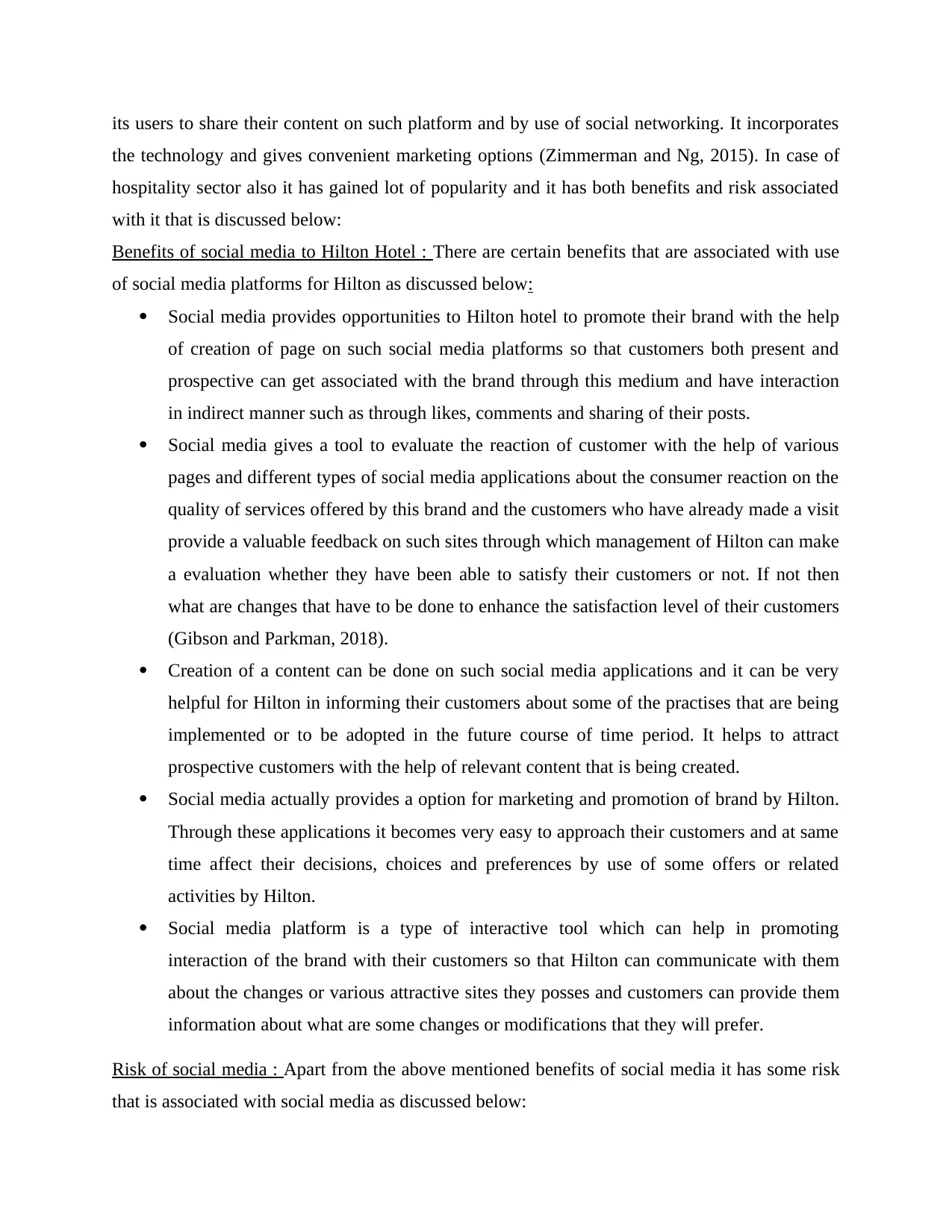
its users to share their content on such platform and by use of social networking. It incorporates
the technology and gives convenient marketing options (Zimmerman and Ng, 2015). In case of
hospitality sector also it has gained lot of popularity and it has both benefits and risk associated
with it that is discussed below:
Benefits of social media to Hilton Hotel : There are certain benefits that are associated with use
of social media platforms for Hilton as discussed below:
Social media provides opportunities to Hilton hotel to promote their brand with the help
of creation of page on such social media platforms so that customers both present and
prospective can get associated with the brand through this medium and have interaction
in indirect manner such as through likes, comments and sharing of their posts.
Social media gives a tool to evaluate the reaction of customer with the help of various
pages and different types of social media applications about the consumer reaction on the
quality of services offered by this brand and the customers who have already made a visit
provide a valuable feedback on such sites through which management of Hilton can make
a evaluation whether they have been able to satisfy their customers or not. If not then
what are changes that have to be done to enhance the satisfaction level of their customers
(Gibson and Parkman, 2018).
Creation of a content can be done on such social media applications and it can be very
helpful for Hilton in informing their customers about some of the practises that are being
implemented or to be adopted in the future course of time period. It helps to attract
prospective customers with the help of relevant content that is being created.
Social media actually provides a option for marketing and promotion of brand by Hilton.
Through these applications it becomes very easy to approach their customers and at same
time affect their decisions, choices and preferences by use of some offers or related
activities by Hilton.
Social media platform is a type of interactive tool which can help in promoting
interaction of the brand with their customers so that Hilton can communicate with them
about the changes or various attractive sites they posses and customers can provide them
information about what are some changes or modifications that they will prefer.
Risk of social media : Apart from the above mentioned benefits of social media it has some risk
that is associated with social media as discussed below:
the technology and gives convenient marketing options (Zimmerman and Ng, 2015). In case of
hospitality sector also it has gained lot of popularity and it has both benefits and risk associated
with it that is discussed below:
Benefits of social media to Hilton Hotel : There are certain benefits that are associated with use
of social media platforms for Hilton as discussed below:
Social media provides opportunities to Hilton hotel to promote their brand with the help
of creation of page on such social media platforms so that customers both present and
prospective can get associated with the brand through this medium and have interaction
in indirect manner such as through likes, comments and sharing of their posts.
Social media gives a tool to evaluate the reaction of customer with the help of various
pages and different types of social media applications about the consumer reaction on the
quality of services offered by this brand and the customers who have already made a visit
provide a valuable feedback on such sites through which management of Hilton can make
a evaluation whether they have been able to satisfy their customers or not. If not then
what are changes that have to be done to enhance the satisfaction level of their customers
(Gibson and Parkman, 2018).
Creation of a content can be done on such social media applications and it can be very
helpful for Hilton in informing their customers about some of the practises that are being
implemented or to be adopted in the future course of time period. It helps to attract
prospective customers with the help of relevant content that is being created.
Social media actually provides a option for marketing and promotion of brand by Hilton.
Through these applications it becomes very easy to approach their customers and at same
time affect their decisions, choices and preferences by use of some offers or related
activities by Hilton.
Social media platform is a type of interactive tool which can help in promoting
interaction of the brand with their customers so that Hilton can communicate with them
about the changes or various attractive sites they posses and customers can provide them
information about what are some changes or modifications that they will prefer.
Risk of social media : Apart from the above mentioned benefits of social media it has some risk
that is associated with social media as discussed below:
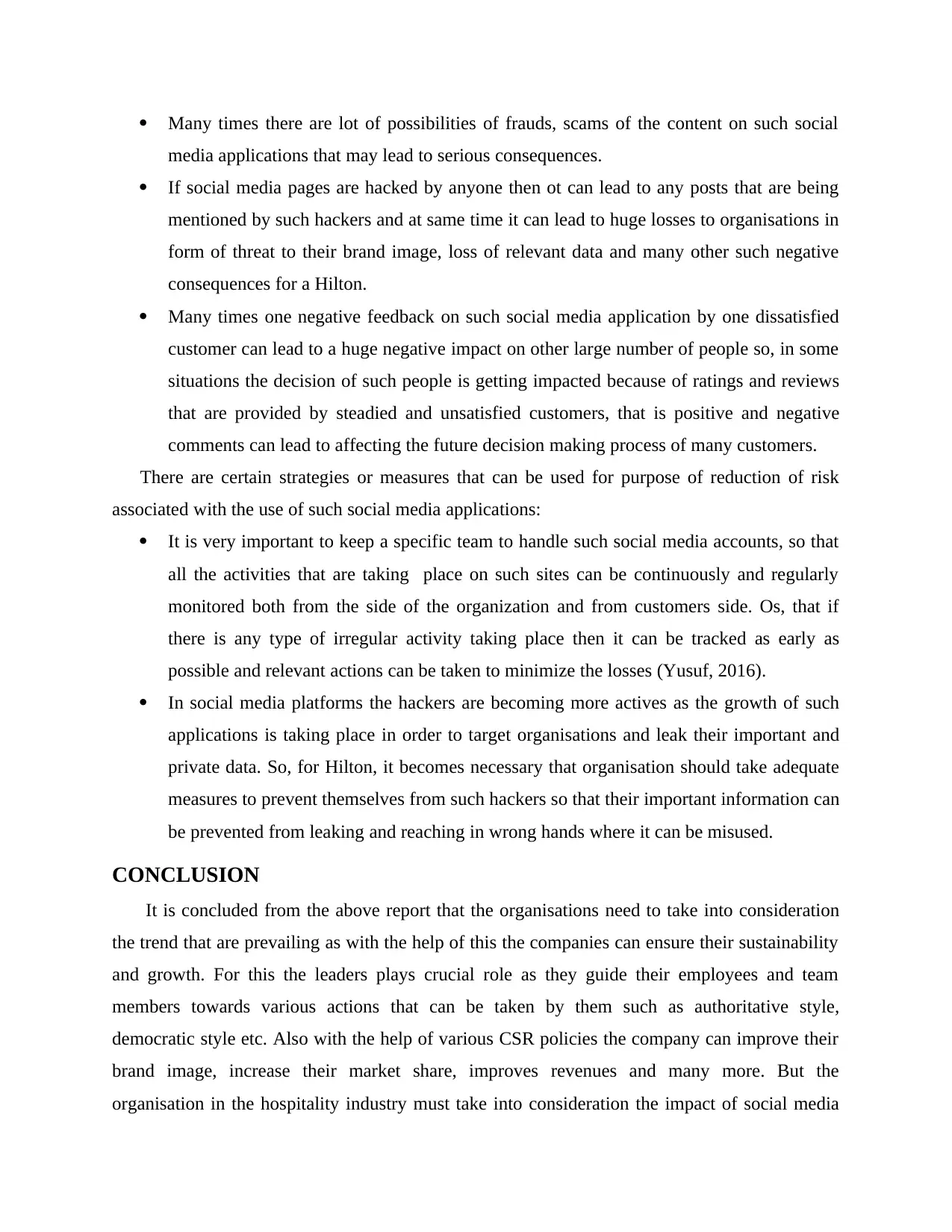
Many times there are lot of possibilities of frauds, scams of the content on such social
media applications that may lead to serious consequences.
If social media pages are hacked by anyone then ot can lead to any posts that are being
mentioned by such hackers and at same time it can lead to huge losses to organisations in
form of threat to their brand image, loss of relevant data and many other such negative
consequences for a Hilton.
Many times one negative feedback on such social media application by one dissatisfied
customer can lead to a huge negative impact on other large number of people so, in some
situations the decision of such people is getting impacted because of ratings and reviews
that are provided by steadied and unsatisfied customers, that is positive and negative
comments can lead to affecting the future decision making process of many customers.
There are certain strategies or measures that can be used for purpose of reduction of risk
associated with the use of such social media applications:
It is very important to keep a specific team to handle such social media accounts, so that
all the activities that are taking place on such sites can be continuously and regularly
monitored both from the side of the organization and from customers side. Os, that if
there is any type of irregular activity taking place then it can be tracked as early as
possible and relevant actions can be taken to minimize the losses (Yusuf, 2016).
In social media platforms the hackers are becoming more actives as the growth of such
applications is taking place in order to target organisations and leak their important and
private data. So, for Hilton, it becomes necessary that organisation should take adequate
measures to prevent themselves from such hackers so that their important information can
be prevented from leaking and reaching in wrong hands where it can be misused.
CONCLUSION
It is concluded from the above report that the organisations need to take into consideration
the trend that are prevailing as with the help of this the companies can ensure their sustainability
and growth. For this the leaders plays crucial role as they guide their employees and team
members towards various actions that can be taken by them such as authoritative style,
democratic style etc. Also with the help of various CSR policies the company can improve their
brand image, increase their market share, improves revenues and many more. But the
organisation in the hospitality industry must take into consideration the impact of social media
media applications that may lead to serious consequences.
If social media pages are hacked by anyone then ot can lead to any posts that are being
mentioned by such hackers and at same time it can lead to huge losses to organisations in
form of threat to their brand image, loss of relevant data and many other such negative
consequences for a Hilton.
Many times one negative feedback on such social media application by one dissatisfied
customer can lead to a huge negative impact on other large number of people so, in some
situations the decision of such people is getting impacted because of ratings and reviews
that are provided by steadied and unsatisfied customers, that is positive and negative
comments can lead to affecting the future decision making process of many customers.
There are certain strategies or measures that can be used for purpose of reduction of risk
associated with the use of such social media applications:
It is very important to keep a specific team to handle such social media accounts, so that
all the activities that are taking place on such sites can be continuously and regularly
monitored both from the side of the organization and from customers side. Os, that if
there is any type of irregular activity taking place then it can be tracked as early as
possible and relevant actions can be taken to minimize the losses (Yusuf, 2016).
In social media platforms the hackers are becoming more actives as the growth of such
applications is taking place in order to target organisations and leak their important and
private data. So, for Hilton, it becomes necessary that organisation should take adequate
measures to prevent themselves from such hackers so that their important information can
be prevented from leaking and reaching in wrong hands where it can be misused.
CONCLUSION
It is concluded from the above report that the organisations need to take into consideration
the trend that are prevailing as with the help of this the companies can ensure their sustainability
and growth. For this the leaders plays crucial role as they guide their employees and team
members towards various actions that can be taken by them such as authoritative style,
democratic style etc. Also with the help of various CSR policies the company can improve their
brand image, increase their market share, improves revenues and many more. But the
organisation in the hospitality industry must take into consideration the impact of social media
⊘ This is a preview!⊘
Do you want full access?
Subscribe today to unlock all pages.

Trusted by 1+ million students worldwide
1 out of 15
Related Documents
Your All-in-One AI-Powered Toolkit for Academic Success.
+13062052269
info@desklib.com
Available 24*7 on WhatsApp / Email
![[object Object]](/_next/static/media/star-bottom.7253800d.svg)
Unlock your academic potential
Copyright © 2020–2026 A2Z Services. All Rights Reserved. Developed and managed by ZUCOL.

